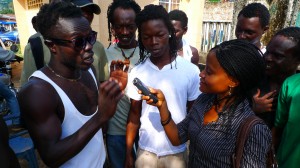Election reporting does and don’ts – after polling day
In some countries, election results are announced within a day, in others it can take a week or longer. This period around the release of the results is often the most tense, and can be marred by violence. In the third part of our series on election reporting, DW Akademie’s Kate Hairsine brings you some dos and don’ts for reporting elections after polling day.
DO be responsible when reporting incidents of violence
It is important to inform people about violent incidents, but you need to do so in a responsible way. Following the 2007 elections in Kenya, the local media was criticized for further inflaming violence.
– Always verify facts before reporting: Where exactly did the incident take place? Who was involved? How many people were involved? Were people killed or injured? What triggered the incident?
– Try to find several sources of information (witnesses, journalists on location, police, army, doctors at the local hospital). Name your sources in the report (and don’t rely on SMS messages from people at the scene who aren’t considered reliable sources!)
– Try to get comments on the violence from people from different ethnic groups and different sides of the political spectrum (but do not air calls for retaliation or more violence)
– Don’t use emotional language or comment on the incident yourself
– Local language stations may be criticized for their neutral broadcasting as they are often expected to share community views. Explain your reasons for being neutral on air
DO take care when reading out SMS messages
Many radio and television stations read out SMS messages or have an SMS ticker. These might represent people’s opinions about the elections or results, but hateful messages have no place on air. Also, be balanced by reading out messages from diverse areas, or from people supporting different parties or groups.
DO cut off callers using hate speech on air
Talkback radio gives people the opportunity to be heard. Plus it’s a lively and cheap way to get diverse opinions on air. But hosts need to be extremely careful that their show doesn’t inflame tensions.
– Cut off callers (and politicians) who use hate speech, ethnic baiting or call for violence
– Explain to the listeners that cutting off such callers is in line with station’s policy and your radio won’t support violent talk (so that you don’t seemed biased)
– Ask listeners to call in with their comments about hate speech
– While some stations argue that airing inflammatory language is good for ratings, the risk of conflict in this post-election period is just too high. Responsibility comes before ratings!
DO prepare messages of peace
If you live in a country with a history of conflict, peace messages, songs and jingles featuring prominent individuals (imams, priests, musicians, movie stars, sports stars, even gangster groups who have promised not to stir up trouble) can go far to calm tensions. Alternatively, ask children for messages of peace. Another idea is to get different groups of people, such as the elderly, market women, or school children, to sing the national anthem (or another song associated with national pride) and play the different versions together with peace messages
DO continue to monitor the counting
Just because the polling day is over, it doesn’t mean that the media’s watchdog role is finished. Things to check:
– Can observers, the media and nominated political party representatives freely enter all tally centers (including at local, district and and regional levels)?
– Do the centers have adequate lighting and security?
– Is the counting taking longer than normal? Why?
DO put the results in context
When the results are finally announced …
– Seek comments from the winners and losers
– Mention the final turnout figure
– Get some reactions from a diverse cross section of people on the street.
– Add some independent analysts and comments from international and domestic observers
DO analyze the results
Your job isn’t over when the results are announced.
– How much did someone win by? Who mainly voted for them (male, female, old young, a particular ethnic group)? Has this changed since the last elections.
– What percentage of people voted? Were there particular groups who didn’t vote? Why? Has this changed from the last elections?
– How many invalid votes where there? Where their regions with more invalid votes? How does this compare to last election?
– What are the country’s prospects under the elected leadership in various fields, such as the economy, law and internal security?
DON’T broadcast political press releases about vote rigging without context
Politicians who have lost the vote (or look like loosing) often favor the strategy of putting out a press release alleging the elections were rigged (which may or may not be true). Don’t just read out the whole press release on air. Rather
– Summarize the allegations using neutral language
– Add information from independent election monitors
– Seek a comment on the allegations from the electoral commission. If they say they will address the comments a later press conference, mention this in your reporting
DON’T forget to continue to monitor the government
As an election reporter, you have a sound grasp of what promises the new government made during its campaign so you are ideally placed to follow up whether its living up to those promises.
For more information, check out UNESCO’s list of online election reporting resources as well as the ACE Electoral Knowledge Network, which is an amazing source information about elections and electoral systems worldwide.
I also highly recommend the “Media & Elections” handbook as well as the “Election Reporting Handbook” by the International Journalist Federation





Feedback